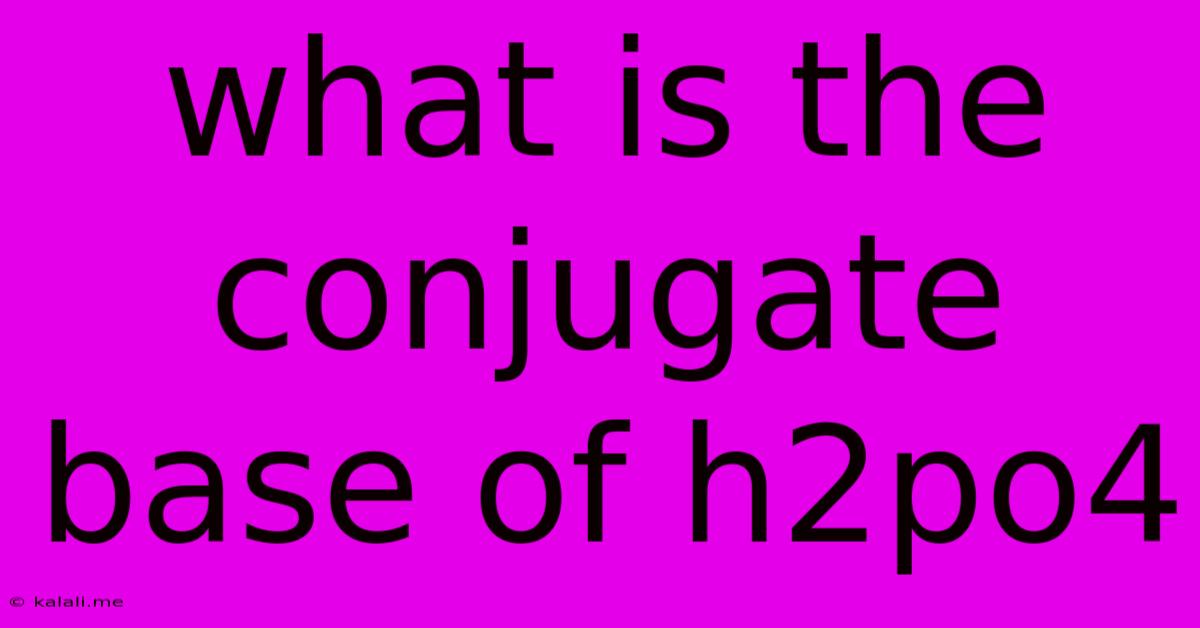What Is The Conjugate Base Of H2po4
Kalali
Jun 12, 2025 · 2 min read

Table of Contents
What is the Conjugate Base of H₂PO₄⁻? Understanding Acid-Base Conjugates
This article will explore the concept of conjugate acid-base pairs and specifically identify the conjugate base of the dihydrogen phosphate ion, H₂PO₄⁻. Understanding conjugate pairs is fundamental to grasping acid-base chemistry and equilibrium reactions. This will involve defining key terms, explaining the relationship between acids and their conjugate bases, and finally, definitively answering the question: what is the conjugate base of H₂PO₄⁻?
What are Conjugate Acid-Base Pairs?
According to Brønsted-Lowry acid-base theory, an acid is a substance that donates a proton (H⁺), while a base is a substance that accepts a proton. When an acid donates a proton, it forms its conjugate base. Conversely, when a base accepts a proton, it forms its conjugate acid. These two species are related by the difference of a single proton.
Think of it like this: an acid-base reaction involves a proton transfer. The acid loses a proton, becoming its conjugate base, and the base gains a proton, becoming its conjugate acid. They are always found in pairs.
Identifying the Conjugate Base of H₂PO₄⁻
The dihydrogen phosphate ion, H₂PO₄⁻, acts as a weak acid in aqueous solutions. This means it can donate a proton to a water molecule. To find its conjugate base, we simply remove one proton (H⁺) from the formula.
Removing one proton from H₂PO₄⁻ leaves us with HPO₄²⁻, the hydrogen phosphate ion. Therefore, the conjugate base of H₂PO₄⁻ is HPO₄²⁻.
Understanding the Equilibrium
The reaction involving H₂PO₄⁻ and its conjugate base can be represented by the following equilibrium equation:
H₂PO₄⁻ (aq) ⇌ H⁺ (aq) + HPO₄²⁻ (aq)
This equilibrium shows the reversible nature of the proton transfer. The position of the equilibrium depends on the strength of the acid and the pH of the solution.
Other Relevant Concepts
-
Amphoteric Nature: It's crucial to note that H₂PO₄⁻ is amphoteric, meaning it can act as both an acid and a base. While we've discussed its conjugate base, it can also act as a base and accept a proton, forming its conjugate acid, H₃PO₄ (phosphoric acid).
-
Polyprotic Acids: Phosphoric acid (H₃PO₄) is a polyprotic acid, meaning it can donate multiple protons. H₂PO₄⁻ is an intermediate species in the stepwise dissociation of phosphoric acid.
In Conclusion
The conjugate base of H₂PO₄⁻ is HPO₄²⁻. Understanding conjugate acid-base pairs is essential for comprehending acid-base reactions and equilibria, particularly within the context of polyprotic acids like phosphoric acid and their various dissociation steps. Remember to focus on the proton transfer to correctly identify conjugate pairs in any acid-base reaction.
Latest Posts
Latest Posts
-
The Intersection Of A Row And Column Is Called A
Jun 13, 2025
-
How Many Lines Does A Sonnet Contain
Jun 13, 2025
-
Which Of The Following Is Not A Primary Pollutant
Jun 13, 2025
-
How Many Seconds Are In 5 Days
Jun 13, 2025
-
What Is Half A Byte Called
Jun 13, 2025
Related Post
Thank you for visiting our website which covers about What Is The Conjugate Base Of H2po4 . We hope the information provided has been useful to you. Feel free to contact us if you have any questions or need further assistance. See you next time and don't miss to bookmark.